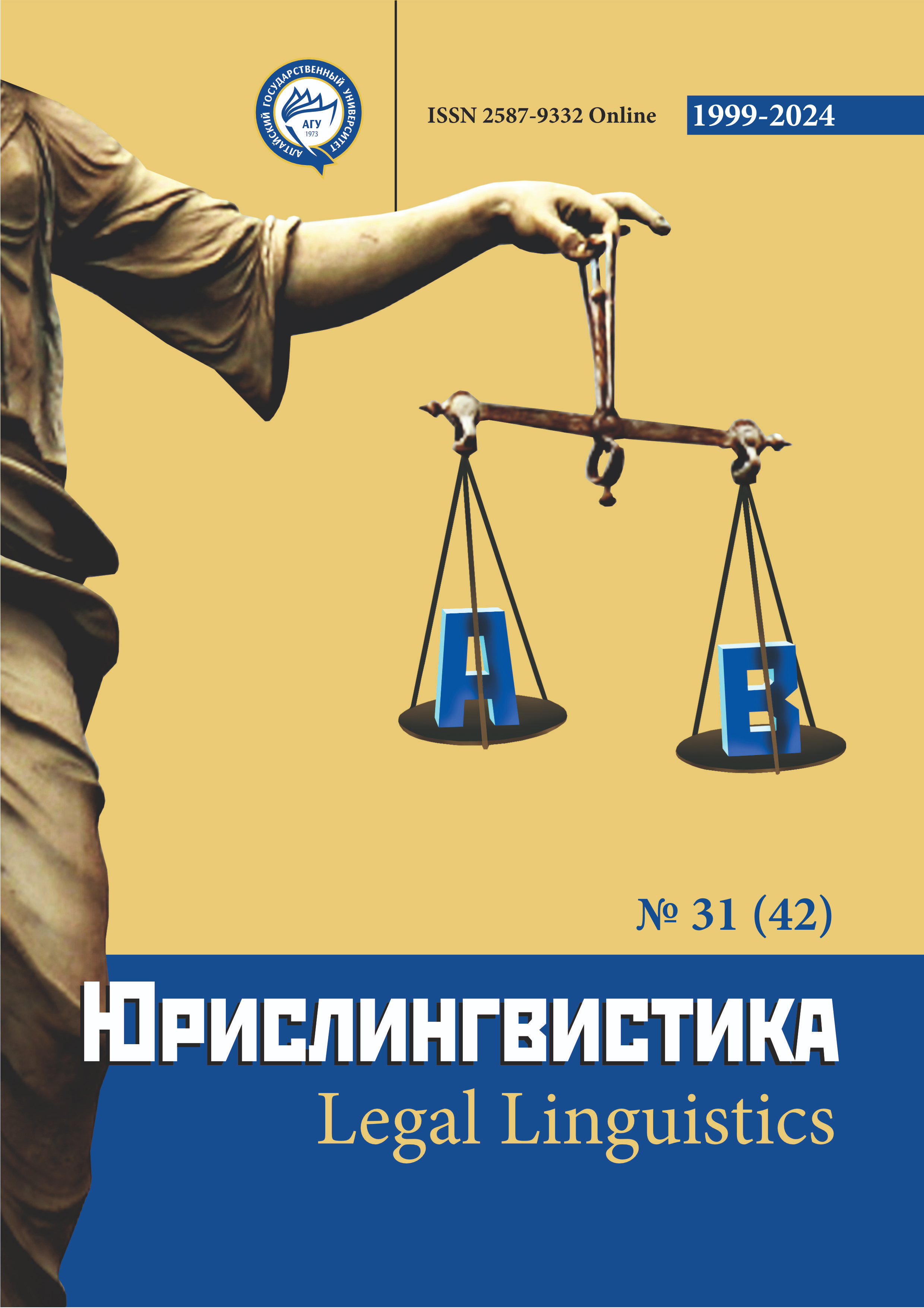Style Features of Judicial Decisions of American Judge Richard Posner
УДК 811.161.1, ББК 81.411.2-5
Abstract
This article proposes to analyze the stylistic features of the presentation of judicial texts used by the American appellate district judge, legal scholar Richard Posner, and to determine the measure of acceptable and necessary judicial creativity, including domestic justice.
The research methodology involves general scientific logical, systemic, analytical and structural-functional methods, a particular scientific method of linguistic analysis, special legal techniques of comparative law, formal legal analysis.
The research was carried out in several stages, including: first, the study of R. Posner's court decisions with identifying specific stylistic features; second, analysis of the identified features and stating R. Posner’s general theoretical premises; third, consideration of the possibilities of developing R. Posner’s ideas in the domestic political and legal context.
As a result of the study, the following features of R. Posner's judicial opinions were identified: simplicity and clarity of the court decision, acceptable deviations from the pretentiousness of the official business style; scientific nature of the court decision, developing the logic of the court decision based on empirical material; the expediency of a court decision, the acceptability of deviations from the “letter” of the law in favor of the “spirit” of the law; a creative approach to a judicial decision, the acceptability of using certain techniques of artistic and journalistic styles of speech; skepticism towards the principle of legal certainty; overcoming the formalism of law, the acceptability of applying the principle of economic efficiency as a source of law (in the broad sense); interdisciplinary character of law, the possibility of using the methodological apparatus of other sciences in legal science; denial of the role of the judge as a passive observer and recognition of the role of the judge as an active political and legal actor.
Finally, the author concluded that the development of R. Posner’s ideas in domestic legal science is appropriate, providing for some clarifications and their critical analysis.
Downloads
References
Domnarsky, W. Richard Posner. New York, 2016.
Posner R. Jurisprudence of skepticism / Michigan Law Review. - 1998.
Posner R. Problems of jurisprudence. Cambridge, 1990.
Posner R. Reflections on refereeing. Cambridge, 2013.
Posner R. The rule of reason and the economic approach: reflections on the Sylvania decision / University of Chicago Law Review. – 1997.
Posner R. Utilitarianism, Economics, and Legal Theory / Journal of Legal Studies. – 1979. – Vol. 8.
Баркаускас против Лейн, 878 F.2d 1031, 1032 (7-й округ 1989 г.) (in English).
Гаджиев Г. А. Право и экономика (методология). М., 2023.
Гринуолт против Департамента исправительных учреждений штата Индиана, 397 F.3d 587, 591 (7-й округ, 2005 г.) (in English).
Кирхнер К. Трудности восприятия дисциплины «Право и экономика» в Германии / Истоки. Экономика в контексте истории и культуры. М., 2004.
Офицеры полиции из числа меньшинств Ass'n of South Bend v. City of South Bend, Indiana, 721 F.2d 197, 202 (7-й округ, 1983 г.) (in English).
Постановление Конституционного Суда РФ от 21.01.2010 №1-П. URL: https://www.consultant.ru/document/cons_doc_LAW_96788/
Регистрация прокурора и дисциплинарное дело Верховного суда штата Иллинойс против Швайкера, 715 F.2d 282, 286 (7-й округ, 1983 г.) (in English).
Соединенные Штаты против Торреса, 751 F.2d 875, 880 (7-й округ 1984 г.) (in English).
Судья Ричард Познер уходит из 7-го округа после 36 лет работы. 01.09.2017. URL: https://www.abajournal.com/news/article/judge_richard_posner_retires_from_the_7th_circuit_after_36_years (in English).
Copyright (c) 2024 Юлия Печатнова

This work is licensed under a Creative Commons Attribution 4.0 International License.
The authors, which are published in this journal, agree to the following conditions:
1. Authors retain the copyright to the work and transfer to the journal the right of the first publication along with the work, at the same time licensing it under the terms of the Creative Commons Attribution License, which allows others to distribute this work with the obligatory indication of the authorship of this work and a link to the original publication in this journal .
2. The authors retain the right to enter into separate, additional contractual agreements for the non-exclusive distribution of the version of the work published by this journal (for example, to place it in the university depository or to publish it in a book), with reference to the original publication in this journal.
3. Authors are allowed to post their work on the Internet (for example, in a university repository or on their personal website) before and during the review process of this journal, as this may lead to a productive discussion, as well as more links to this published work (See The Effect of Open Access).










